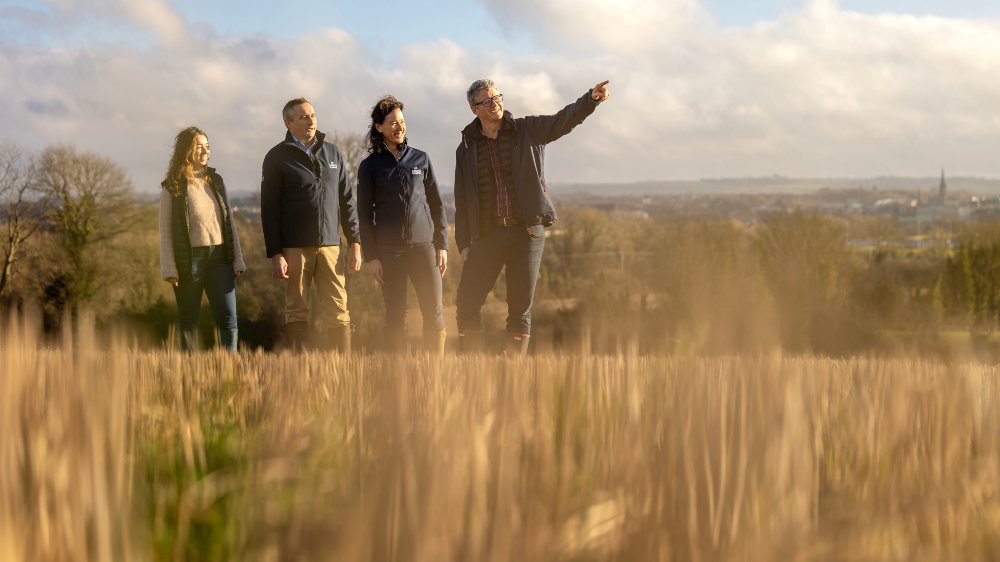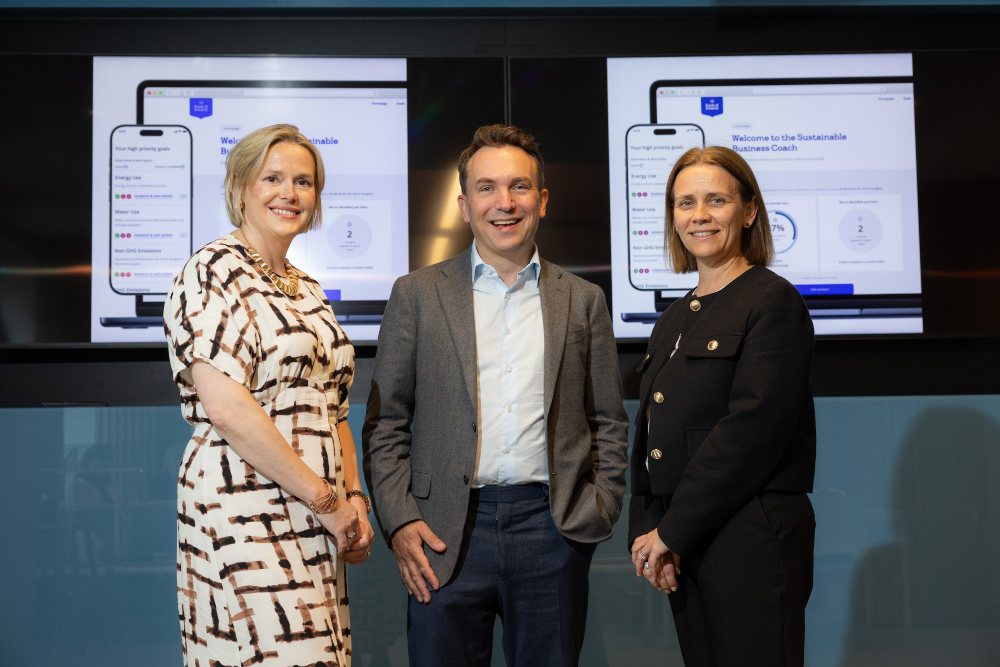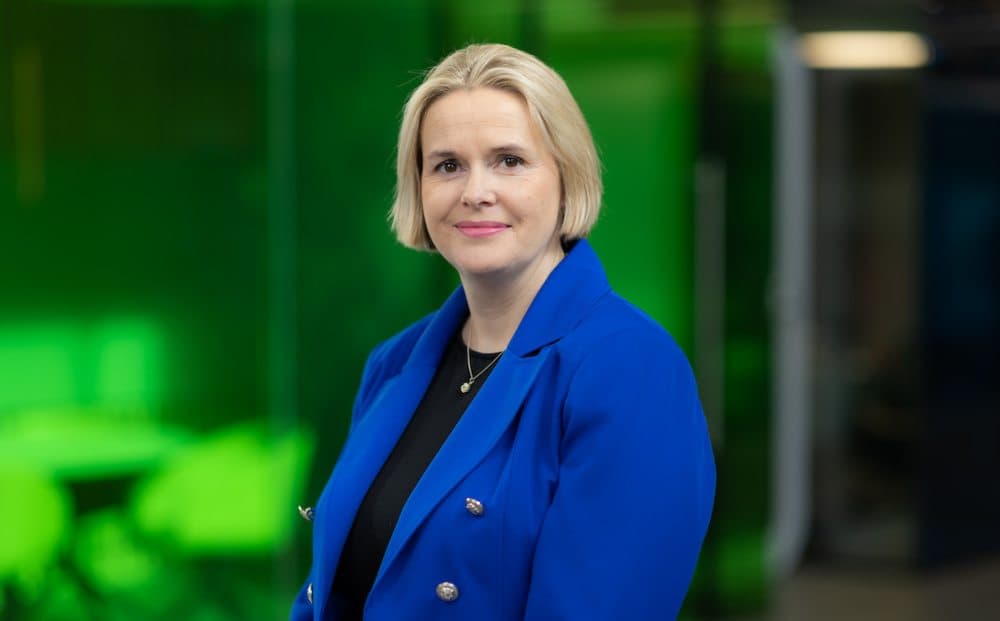Podcast Ep 268: Bank of Ireland’s chief sustainability and investor relations officer Eamonn Hughes on how Bank of Ireland is positioning itself at the centre of Ireland’s sustainability transition.
As Bank of Ireland’s first chief sustainability and investor relations officer, Eamonn Hughes embodies the profound shift taking place across global finance. His appointment in 2022 reflects not just regulatory pressure, but a fundamental recognition that climate change and broader environmental, social, and governance factors will reshape the financial landscape over the coming decades.
In an in-depth interview as part of our new ESG (Environmental, Social and Governance) podcast series with the Bank’s ESG lead Lourda Sexton, Hughes discussed the Irish Bank’s approach to ESG, sustainable finance targets, and the role of financial institutions in the green transition.
“Ultimately, we want to do a really good job, it’s not just finishing at €30bn in 2030 – it’s ultimately to green the whole loan book”
Hughes arrived at his position through an unusual path. After spending close to 30 years as an analyst covering financial institutions, his interest in sustainability crystallised around 2019/2020. “There was one regulatory paper in particular in 2020 that I realised as an analyst, that I needed to start getting my head around this, because this was going to have financial impact on banks and the capital of banks over the next couple of decades,” he explains. “The more I delved into it, the more I got sucked into it, and became much more interested in it – not just from an impact in terms of the Bank’s balance sheet, but also the significant reallocation of capital that’s coming over the next couple of decades.”
In the intervening five years, Hughes has become the driving force behind the Bank of Ireland’s sustainability vision. In essence it is an all-encompassing mission that transcends the fundamental role of banking on our planet, the Bank’s place in the communities it serves, its duties as a responsible and inclusive employer and, fundamentally, its care of the environment.
A strategy built on three pillars
He said Bank of Ireland’s approach to sustainability rests on three foundations: supporting the green transition, enabling colleagues to thrive, and enhancing financial wellbeing. This structure deliberately extends beyond the environmental focus that dominates much sustainability discourse.
“Climate change tends to steal the thunder a little bit around ESG – people tend to focus on the E part, the environmental part,” Hughes observes. “There’s an emerging realisation that it’s not just climate change, it’s biodiversity loss, how we deal with pollution, marine degradation.”
The Bank’s commitment extends into social factors, particularly housing, which Hughes identifies as consistently ranking amongst Ireland’s top societal challenges. The institution currently finances 24,500 homes across various sites nationwide, with plans to expand this to 30,000 homes whilst convening stakeholders to accelerate housing development delivery.
The financial metrics tell a compelling story of rapid progress. When the Bank launched its strategy in early 2023, sustainable finance stood at just over €8bn with a target of €15bn by end-2025. The Bank achieved this milestone by the first quarter, reaching €15bn by the second quarter. The next checkpoint is 30 billion by 2030. Hughes has an even more ambitious long-term vision: “Ultimately, we want to do a really good job, it’s not just finishing at €30bn in 2030 – it’s ultimately to green the whole loan book, which was €82bn to €83bn at the end of June.”
Always be innovating
Hughes said the Bank’s approach to product development demonstrates sophisticated thinking about sector-specific solutions. The EcoSaver mortgage, launched in April 2024, represents a particular innovation in European finance, for example.
Traditional green mortgages typically favour only the highest-rated properties. EcoSaver offers incremental discounts of 0.05 percentage points for every improvement in energy rating.
“What made this relatively unique, and actually quite unique in the European context,” Hughes notes, “is that whilst the typical green mortgage was deemed as A and B mortgages in terms of higher rated properties, what EcoSaver does is it offers a slightly cheaper rate – the higher the energy rating.”
The product’s success has been remarkable, with roughly 90% of new fixed-rate mortgage business conducted through EcoSaver. The Bank has complemented this with sophisticated digital tools developed in partnership with SSE Airtricity, allowing customers to model retrofit investments alongside available grants.
In agriculture, the Bank developed Enviroflex, initially partnering with Kerry Group before expanding to approximately 95% of cooperatives across the country, offering rate discounts for improved environmental behaviours on farms.
For SMEs, the Bank also recently launched its Sustainable Business Coach platform. This is a free digital tool that is designed to support SME customers with sustainability planning to identify their ESG priorities.
The regulatory landscape
The European Union’s Corporate Sustainability Reporting Directive (CSRD) has created both opportunities and challenges. As a first-wave reporter, Bank of Ireland produced 140-150 additional pages of sustainability data.
“It’s a big effort,” Hughes acknowledges. “That’s the first piece of advice. Prepare well.”
Recent developments suggest relief may be coming, with accounting bodies indicating roughly a 60% reduction in required data points and scaling back requirements for small and medium enterprises. Hughes maintains that much of this information remains valuable for better decision making and capital reallocation.
Powering the offshore future of energy in Ireland
Ireland’s extensive coastline presents enormous potential for offshore wind development. The Irish Government’s Climate Action Plan requires €125bn by 2030, with energy representing roughly one-third of this investment.
“By definition, the opportunity is very significant,” Hughes observes, though he acknowledges the extended development timeframes for offshore projects. The Bank has already made significant commitments, with its largest single green energy investment being €98m euros for the Inch Cape offshore wind project in Scotland, undertaken in conjunction with ESB.
Another investment that was announced last week involves a £80m (€93.5m) commitment to East Anglia 3, an offshore wind farm that is set to become the second largest in the world when it begins operation next year.
Maintaining course
Some organisations have stepped back from sustainability commitments amid changing political narratives, particularly in the United States. But Bank of Ireland is maintaining its course around sustainability, diversity and inclusion.
Hughes identifies two concurrent phenomena: political dynamics leading some institutions to reduce public advocacy, and a broader maturation of sustainability thinking. “I think there’s been an evolution of sustainability, which is welcome, because people step back, take a breather, and then go again,” he explains.
The Bank’s commitment remains unwavering. “We’re absolutely committed to sustainability,” Hughes states. “We’re a listed entity quoted on the stock market. We realise there’s quite a significant opportunity here in terms of that reallocation of capital that’s coming. It’s absolutely incumbent on us – our customers have to transition, and our job is to support them as they transition on their own sustainability journeys.”
Beyond green finance
Bank of Ireland’s sustainability agenda extends well beyond environmental concerns into social impact and human capital development.
The institution has contributed millions to various charities through more than 300 projects since 2020, whilst its financial education programmes have reached 700,000 children in schools across Ireland.
Employee development represents another crucial dimension, with the bank recognising its role in developing skills for a changing economy amongst its 10,000 to 11,000 staff members.
The strategy is working. Earlier in 2024, the Bank ranked seventh in the Irish Independent’s list of Ireland’s top 200 employers, a significant improvement from previous years.
Hughes believes sustainability credentials will increasingly influence talent attraction.“If we do sustainability well, that’ll resonate with people in wider society that would think Bank of Ireland might be a good place to work because they can actually have an influence on how the country develops.”
The long game
Hughes takes an optimistic view of the transition timeline. Whilst acknowledging slower-than-necessary progress on climate action, he points to demonstrable achievements. The Paris Climate Agreement in 2015 put the world on track for roughly four degrees of warming. He says investments over the past decade have begun to slow that trajectory. In Europe, the European Commission’s latest research suggests the continent is on track to meet its 55% emission reduction target by 2030.
For Bank of Ireland, the ultimate goal is clear: complete transformation of its loan book by 2050. “We have to transition our whole loan book – mortgages, commercial real estate, industry, corporate and commercial SMEs, consumer finance. We have to do everything,” Hughes explains. This represents not just an environmental imperative but a business necessity, as the Bank’s balance sheet must evolve to protect the capital that supports its lending activities.
The institution’s approach reflects a broader understanding that sustainability encompasses far more than environmental concerns. With €55.5bn euros in assets under management, the Bank sees enormous potential in helping Ireland develop better savings and pension planning as the population ages. One-third of Irish citizens currently lack private pensions, making this both a social challenge and a business opportunity.
Hughes points out that Bank of Ireland has been operating for 242 years and intends to continue for many more. In an era of rapid change, sustainability offers not just regulatory compliance but a pathway to long-term relevance and prosperity. The green transition, he urges, represents an opportunity that must be seized.
-
Bank of Ireland is welcoming new customers every day – funding investments, working capital and expansions across multiple sectors. To learn more, click here
-
For support in challenging times, click here
-
Listen to the ThinkBusiness Podcast for business insights and inspiration. All episodes are here. You can also listen to the Podcast on:
-
Spotify
-
SoundCloud
-
Apple





